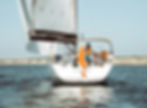
Boat License Requirements in Europe
Boat License Requirements in Europe
Your complete guide to boating licenses, rules, and local differences across Europe.
Planning to rent a boat in Europe? Here's what you need to know about licenses, certificates, and country-specific rules – explained clearly for travelers and first-time boaters. Whether you're planning a day trip, a coastal cruise, or an inland river journey, understanding legal requirements is essential. This guide covers it all.
Do You Need a Boat License in Europe?
Yes – in many cases. However, license requirements vary significantly depending on the country you're in, the size and power of the boat, and whether you're navigating coastal waters or inland waterways. For example, in Denmark, boats under 15HP usually don’t require a license, while in Greece or Croatia, even smaller vessels often require formal certification. The golden rule: Always check local regulations before booking.
The ICC – International Certificate of Competence
The ICC is one of the most widely recognized boating certificates in Europe. It demonstrates that the holder has the basic seamanship skills and knowledge required to operate a pleasure craft safely. Many boat rental companies require an ICC, particularly in popular sailing destinations like Croatia, Italy, and Spain. It is typically issued by national boating authorities and is often valid for both motor and sailing vessels. Holding an ICC greatly simplifies renting boats across borders.
What is CEVNI and When Do You Need It?
CEVNI stands for 'Code Européen des Voies de Navigation Intérieure' and is essentially the highway code for Europe's inland waterways. It outlines the navigation rules for rivers, canals, and lakes in countries like France, Germany, and the Netherlands. If you're planning to operate a boat on these waterways, especially without a skipper, you’ll likely need to pass a CEVNI exam and carry proof of this alongside your ICC.
What If You Don’t Have a License?
If you don’t have a license, you’re not out of options. Many boats can be rented with a skipper – a professional who takes responsibility for navigating and safety, allowing you to relax. In some areas, like in parts of Denmark or the French Riviera, you can also rent smaller, low-powered boats without any formal certification. Guided tours and sightseeing boats are another great alternative for enjoying time on the water license-free.
Country-by-Country Overview
Each country has its own rules and exceptions. In Greece, you need an ICC and a second crew member with basic skills. In Germany, you’ll need a license if the motor exceeds 15HP, and CEVNI if you’re on rivers. Italy typically requires a license for anything over 40HP. France distinguishes between coastal and inland rules. The Netherlands requires a license if your boat is over 15 meters or goes faster than 20km/h. Always confirm with local operators or maritime authorities before your trip.
Types of Boats and License Requirements
Sailboats, motorboats, and speedboats often require proof of competence, especially if they are powerful or intended for offshore use. Houseboats may not require a license, especially if they are stationary or very slow-moving. City cruise boats are usually operated by professionals, so no license is needed. Be aware that even if a license is not mandatory, rental companies may still ask for proof of experience or a short practical demonstration.
How to Get an ICC or National License
To get an ICC, you usually take a short course (1–2 days) that includes both theoretical and practical components. In some countries, if you already hold a national boating license, you can apply for an ICC conversion without re-testing. For example, the UK’s RYA and Denmark’s Søfartsstyrelsen offer recognized pathways. Expect to pay around €150–€350. Many schools offer weekend courses, making it accessible for tourists or aspiring boaters.
Required Documents for Boating Abroad
When boating in another country, you should carry the following: your boating license (ICC or national equivalent), valid photo ID or passport, a copy of the rental agreement, and proof of insurance. It's also smart to have a digital backup (photos or PDFs on your phone). Some ports or maritime police may conduct spot checks, especially during high season or near busy harbors.
Safety and Compliance Tips
Always follow the local rules: observe speed limits, respect no-wake zones, and avoid restricted areas like marine reserves or military zones. Children must wear life jackets in many countries, and everyone should be familiar with basic emergency procedures. Most importantly, never operate a boat under the influence of alcohol – boating under the influence is illegal in most European countries and can result in fines or criminal charges.
HejBoat Makes It Easy
We want boating to be easy, fun, and safe. That's why all our listings clearly show whether a license is required, and if a skipper is available or included. Not sure what applies to your destination? Just send us a message at hej@hejboat.com – we’re happy to guide you. Want to get your ICC? We’ll help you find a certified school near you. Let HejBoat take the stress out of boating.









































